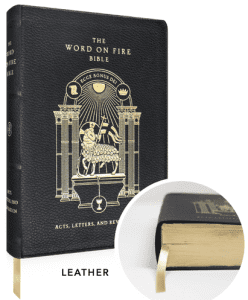I reviewed Bishop Robert Barron‘s The Word on Fire Bible, Volume I: The Gospels on 2 June 2020. This is the follow-up volume, completing the New Testament, called The Word on Fire Bible (Volume II): Acts, Letters and Revelation: a beautiful leather-bound Bible (NRSV version). What general editor Brandon Vogt wrote about the first volume applies to this one as well:
Imagine Bishop Barron’s Catholicism film series (art, beauty, culture, Bishop Barron’s genius) all wrapped beautifully around the Scriptures. Then add tons of insightful commentary from the Church Fathers, saints, popes, and contemporary spiritual masters. Then produce it all using the highest quality paper and leather, and you have something truly groundbreaking: the Word on Fire Bible. It’s smart, beautiful, resplendent–a cathedral in print. There’s never been a Bible like it before.
Its book page on the Word of Fire website states that “it was created for people reading the Bible seriously for the first time, who may be unsure of what to make of its many events and characters.” It’s the deliberately evangelistic impulse that is the notable “draw” here, along with a corresponding emphasis on beauty. It’s a very esthetically pleasing Bible, and includes many great works of art and beautiful photographs. The layout and typesetting are quite appealing to the eye as well, before one even gets to the marvelous content.
As I did last time, I’d like to consider some examples of the commentary, to give readers an idea of the approach in this wonderful Bible. Since it is an effort itself at evangelistic outreach, I’d like to consider Bishop Barron’s own commentary on one of the key verses for evangelism and apologetics:
1 Peter 3:15-16a (NRSV) but in your hearts sanctify Christ as Lord. Always be ready to make your defense to anyone who demands from you an accounting for the hope that is in you; [16] yet do it with gentleness and reverence. Keep your conscience clear, . . .
Bishop Barron’s comment on this passage takes up two-and-a-half pages, and it’s a real gem. Here are some highlights:
In many ways, this passage . . . is the master text for theologians and apologists up and down the centuries to the present day. Something distinctive to biblical Christianity is that, from the beginning, it has been very interested in the clear and articulate expression of doctrine. . . .
Christianity has always had a strong ethical code, grounded in the Sermon on the Mount, but it has never been satisfied with mere orthopraxis. . . . This is also why, from the earliest times, the Church has proposed creeds — formal statements of belief — . . . Before being baptized, a person had to say what it was that he or she concretely believed. . . .
St. Peter is telling ordinary believers that they are to be theologians, precisely because people will be curious about the extraordinary hope they demonstrate. And when they are asked, Christians should be ready to respond. Therefore, fellow believers, we cannot let ourselves off the apologetic hook. . . .
I have been complaining for a long time about a “dumbed-down Catholicism” that has held sway, sadly, since the Second Vatican Council, . . .
Who is against being kind? But the moment you say that your religion is about definite doctrinal claims, like it or not, you’re going to get into arguments. . . .
Peter adds, “Yet do it with gentleness and reverence. Keep your conscience clear.” This is indispensably good advice that I’ve tried to follow in my own ministry. Someone might be perfectly correct in his theological argumentation, but if he is obnoxious to his interlocutors, his intellectual rectitude will prove of no evangelical avail.
Amen!
St. Paul’s preaching in Athens (Acts 17:16-34) is another crucial and illustrative passage having to do with evangelical method. Here we have an example of “how Paul went about evangelizing, or preaching the gospel”: and in this instance the recipients were the ultra-intellectual Greeks in Athens. Once again, Bishop Barron offers readers a two-and-a-half page commentary, filled with sage advice:
The account of St. Paul’s address on the Areopagus in Athens is a sort of masterclass in the evangelization of the culture, and anyone engaged today in that essential task should read it with care. . . .
It is by a sure instinct that Christians — from Paul and Augustine to Thomas Aquinas, John Henry Newman, and John Paul II — have made their way to centers of thought, communication, and the arts. If Jesus’ great commission is to be honored, culture must be evangelized. . . .
In accord with the old rhetorical device of captatio benevolentiae (capturing the good will of one’s audience), Paul compliments the Athenians on their spirituality: “I see how extremely religious you are in every way.” There is more here, of course, than mere courtesy, for Paul is in fact appealing to what the Fathers of the Church would later call logoi spermatikoi (seeds of the Word) — that is to say, hints, echoes, and indications of the Logos that is fully disclosed in Christ. . . . In a word, he elected to build upon a religious foundation already in place in the society he was addressing, assimilating into his distinctively Christian proclamation what he could. . . .
One might think that, in the wake of his magnificent address, Paul brought in boatloads of converts, but in fact the payoff was pretty slim: . . . A handful of people were were willing to give Paul the benefit of the doubt . . . A final lesson for evangelists: in accord with Mother Teresa’s principle, don’t primarily focus on being successful; focus on being faithful. Announce the Gospel, and leave the increase up to God and his timing.
Any Christian would surely benefit by the insights offered in this volume, and the non-Christian (as many who are willing to read it) will inevitably be drawn into the great Net. And that’s what it’s all about. I give it six stars out of five!
***
Photo credit: from the book page on the Word of Fire website.
***
Summary: Bishop Barron’s Word on Fire Bible (Acts, Letters, & Revelation), is a superb, beautiful, educational, & evangelistically oriented volume. Highest recommendation!














